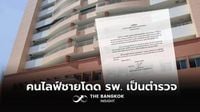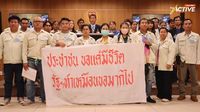On May 7, 2025, a group of labor representatives from Yanphan Company, which recently closed its doors and laid off over 800 employees without compensation, took their grievances to the Committee on Labor Affairs in Thailand's House of Representatives. These employees, who were affected by the company's failure to adhere to the Labor Protection Act of 1998, are seeking justice for their dismissals and compensation that they believe is rightfully theirs.
The employees submitted a letter addressing two main issues. Firstly, they requested an urgent follow-up on the compensation for their dismissals, referencing an official document from the Ministry of Labor dated February 11, 2025. This document calls for clarity regarding the timeline and measures to resolve the issues faced by the laid-off workers from Yanphan Company, as well as from Alpha Spinning and AEM Spinning, which also faced similar problems.
Secondly, the labor representatives urged the committee to investigate the police's use of the Public Assembly Act of 2015 in prosecuting workers who have been protesting their layoffs and lack of compensation. They argue that this could constitute a violation of citizens' rights and freedoms, particularly in their pursuit of justice.
According to reports, Yanphan Company shut down on February 26, 2025, leaving its employees without severance pay or any form of advance notice, which is a legal requirement under the Labor Protection Act. The workers have been protesting since December 25, 2024, initially outside their workplace and later moving to the Office of the Prime Minister, where they have remained for over five months, demanding fair treatment.
During their protests, the workers have received support from various groups and organizations. They have called on the government to allocate emergency funds to assist the affected workers, totaling approximately 3,000 individuals from four different companies, including Alpha Spinning and AEM Spinning. The total requested amount is around 466 million baht, as referenced by the Department of Labor Protection and Welfare.
In a show of solidarity, the labor representatives emphasized that their request for government funds is not merely a handout. They argue that if the Cabinet approves their request, any assets seized from the employer can be returned to the state, creating a potential recovery path for the government.
The Labor Minister, Phipat Ratchakitprakarn, has already acknowledged the urgency of the situation by signing off on the request for funds on February 11, 2025. However, as of May 4, 2025, the issue remains pending review by the Cabinet.
In addition to their immediate requests, the labor representatives have been actively engaging with various government agencies to propose long-term solutions to labor issues across Thailand. These include establishing a fund for unemployment insurance and revising laws regarding the seizure of employer assets and the prioritization of creditors.
On April 9, 2025, the Ministry of Labor held a meeting to gather opinions on providing guarantees for severance pay in cases of layoffs. Workers from Yanphan Company and other affected employees were invited to participate and share their insights.
However, the situation took a concerning turn when representatives from the labor group received summons from the police, alleging that they had organized an illegal assembly near the Prime Minister's Office on April 1, 2025. This has raised fears among the workers, who have been peacefully protesting and seeking dialogue with government officials for months.
As the workers continue their fight for justice, they express deep concern over their financial burdens and the rising cost of living. They stress that timely compensation could significantly alleviate their hardships. Sea Jumpathong, the vice-chairman of the Labor Committee, expressed understanding and concern for the plight of these workers, stating that numerous similar complaints have been received from across the country.
The committee plans to address these issues by inviting relevant agencies to provide information and factual accounts to assist in resolving labor-related problems. The workers remain hopeful that their situation will be included in the Cabinet's agenda soon, as they continue to advocate for their rights.
Meanwhile, the political landscape surrounding this issue has become increasingly complex. As tensions rise between various political factions, the implications of the labor disputes extend beyond individual companies, reflecting broader economic and social challenges faced by workers in Thailand.
In a separate but related development, the Senate has been scrutinizing the actions of over 60 senators amid allegations of collusion in the electoral process. The Election Commission is reportedly collaborating with the Department of Special Investigation to address these concerns, which have resurfaced following conflicts between political parties over land management and other contentious issues.
As the labor representatives from Yanphan Company continue their struggle, they symbolize the challenges faced by many workers in Thailand who seek justice and fair treatment in the wake of corporate decisions that impact their livelihoods.
Their ongoing protests serve as a reminder of the critical importance of labor rights and the need for effective government intervention to protect workers from exploitation and ensure their well-being.





